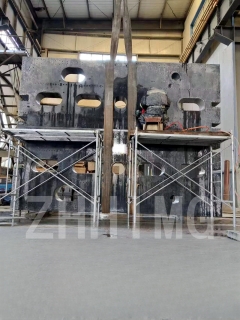The granite base in Coordinate Measuring Machines (CMMs) plays a critical role in ensuring the accuracy of measurements and precision of the equipment. CMMs are high-precision measurement devices used in various industries, such as manufacturing, aerospace, automotive, and medical. They are used to measure the dimensions, angles, shapes, and positions of complex objects. The accuracy and repeatability of CMMs depend on the quality of their components, and the granite base is one of the most crucial ones. In this article, we will explore the main functions and benefits of using a granite base in CMMs.
1. Stability and rigidity
Granite is a type of rock that is formed by the slow crystallization of magma below the Earth's surface. It has a uniform structure, high density, and low porosity, which make it ideal for use as a base material in CMMs. The granite base provides excellent stability and rigidity to the measuring system, ensuring that there is no movement or vibration during the measurement process. This stability is necessary because any movement or vibration during the measurement process can lead to errors in the measurement results. The rigidity of the granite base also helps to minimize errors due to temperature changes.
2. Damping
Another essential function of the granite base is damping. Damping is the ability of a material to absorb and dissipate mechanical energy. During the measurement process, the CMM's probe comes into contact with the object being measured, and any vibrations produced can cause errors in the measurement. The granite base's damping properties allow it to absorb vibrations and prevent them from affecting the measurement results. This property is especially critical because the CMMs are often used in high-vibration environments.
3. Flatness and straightness
The granite base is also known for its excellent flatness and straightness. The flatness and straightness of the base are critical because they provide a stable and accurate reference surface for the measuring system. The accuracy of the CMM's measurements depends on the alignment of the probe with the reference surface. If the base is not flat or straight, it can result in errors in the measurement results. The granite's high degree of flatness and straightness ensures that the reference surface remains stable and accurate, providing reliable results.
4. Wear resistance
The granite base's wear resistance is another essential function. The CMM's probe moves along the base during the measurement process, causing abrasion and wear to the surface. The granite's hardness and resistance to wear ensure that the base remains stable and accurate over an extended period. The wear resistance also helps to reduce maintenance costs and extend the life of the CMM.
In conclusion, the granite base in CMMs plays a critical role in ensuring the accuracy and precision of the measurement system. Its stability, rigidity, damping, flatness, straightness, and wear resistance contribute to the equipment's reliability, minimizing errors and providing accurate measurements. Hence, the use of granite as a base material is widespread in the industry and is highly recommended for anyone seeking to achieve precise measurements.
Post time: Apr-01-2024

